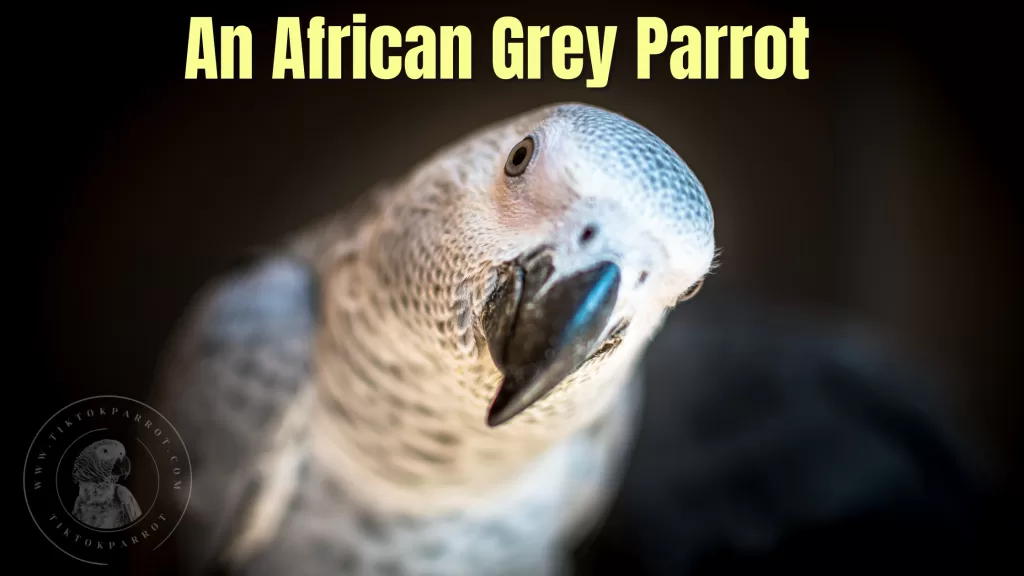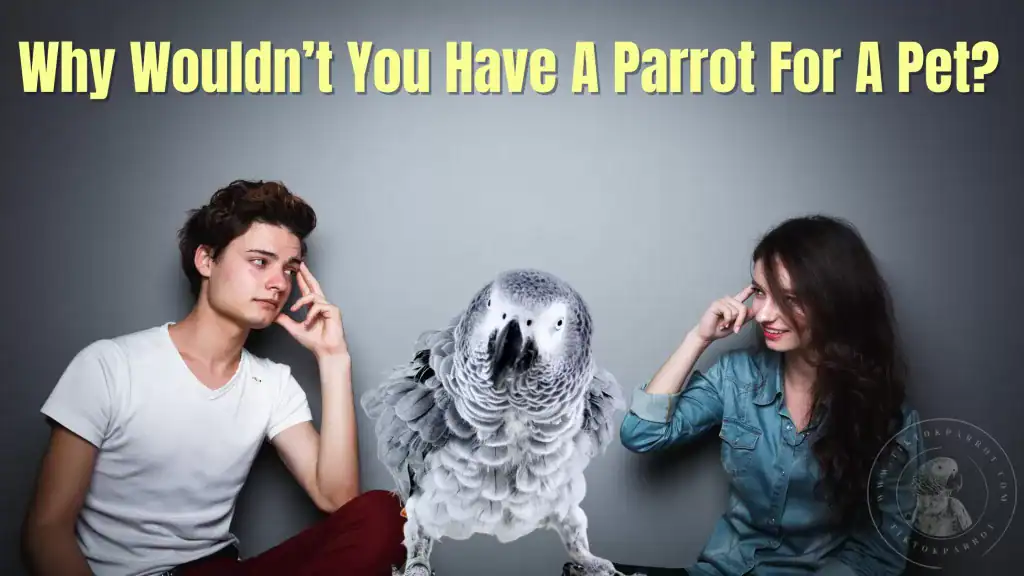Our cleaning lady keeps her cell phone with her, even while she works. One day, she was vacuuming the floor and her phone starting to ring. She didn’t hear it. Our pet, Mitthu, had associated telephones with the word “hello.” That’s what he hears after we pick up the phone so it’s a natural association. Mitthu started saying “hello”, over and over again. Our cleaning lady heard Mitthu and stopped the vacuum cleaner to see what he was excited about. Then she heard her phone ringing. What kind of pet can talk to you and is smart enough to associate one sound with another sound?
Are African Grey Parrots right for you? Explore the unique characteristics, care needs, and factors to consider in this comprehensive guide to the engaging African Grey Parrot.
An African Grey Parrot
They are also known as Grey parrot or Grey African parrot. There are two types of grey African parrots called the Congo African Grey parrot and the Timneh African Grey parrot. The Timneh is slightly smaller than the Congo African Grey parrot.
The Congo African Grey has light grey feathers with a distinctive red tail. The Timneh is a darker grey with a maroon tail. The males are 12 to 14 inches long and the females are slightly smaller. Congo African Greys are a little larger than Timneh African Grey parrots. With a proper diet, these grey African parrots can live more than 50 years.
Owning a parrot is a long-term commitment
Cats and dogs typically live 10-15 years. Pet owners aren’t used to the idea of their pet outliving them as a parrot can. A parrot’s lifespan can include three to five generations of dogs or cats. Your companion will be with you for many years. Only bring a parrot into a stable home situation, as they will bond with humans as their flock and look to you for security. While it is a big responsibility to provide a home for a parrot, the rewards are worth it.
African Grey Parrots are one of the most intelligent birds
They make exceptional companions who can talk and communicate quite well. Because of their longevity, you have the time to build a very strong bond. Your parrot will mimic your voice and learn to communicate with you verbally. They have amazing verbal skills. Our parrot, Mitthu, could speak four different languages English, Urdu, Pashto and Arabic and knew complete phrases as well.
Every once in a while, we’ll be having a conversation and Mitthu will say something that fits perfectly in the conversation. For example, we were deciding whether to buy a nice digital camera. I showed my cousin the offer from a vendor and asked him what he thought. At that very moment, Mitthu said “Sure.” Mitthu was having fun.
Why do people love African Grey Parrots?
The charm of African Grey Parrots lies not only in their beauty but also in their brains. They’re known to be among the most intelligent of all bird species. African Greys have been studied for their problem-solving skills, understanding of human speech, and ability to mimic a wide range of sounds. Some parrots have been reported to have a vocabulary of over 1000 words!
The Emotional Bond
Many African Grey owners talk about the deep emotional bond they share with their feathered friends. These birds are capable of displaying a range of emotions and can form strong attachments to their human caretakers. But remember, this bond requires a lot of time and patience to develop.
Parrots can get bored
Because of their high intelligence, parrots can get bored easily. You have to provide toys for them to keep them challenged. We have many that we’ve purchased and rotate so Mitthu is exposed to new toys frequently. Not all of the toys survive Mitthu’s attacks. Parrots have very strong beaks and love to destroy their toys.
Toys don’t have to be expensive
Mitthu was happy to tear up cardboard boxes from frozen pizzas or milk cartons. I make small cuts in a milk carton so he can hold it easier, but he is surprisingly strong. Despite his weight of 550 grams (just over 1 pound), he easily manipulates a 1-liter (1 quart) milk carton to chew it up.
If you don’t keep your parrot challenged mentally, it is possible they could start picking at their feathers. This is usually a sign of boredom but could be a medical reason. Take your parrot to the veterinarian if he starts plucking his feathers out. Parrots will molt and get new feathers in and it is normal for your parrot to preen himself. I’m referring to more self-mutilation. If you see bald spots, head to the vet.
Parrots are very social
Parrots live in the wild in flocks. This is for protection and they are social creatures. Your parrot will quickly become part of your family. They typically have a strong bond with one family member. Mitthu could fly and if he gets scared, he likes to go to my wife for comfort. During a thunderstorm, he flew onto her shoulder and was shaking. Gaby calmed him down with a soothing voice and scratched the back of his head.
Why wouldn’t you have a parrot for a pet?
Because parrots are social, it’s not a good idea to leave them alone all day. They need companionship. We have someone in our home nearly all of the time. Some parrot owners buy two or more parrots. The warning we’ve heard is the parrots might not bind to your family if there are other parrots in the home. We have thought about adding another parrot to our family, but Mitthu seems happy with the status quo and we are too.
Because of the parrot’s the very strong beak, they are not ideal pets for families with small children. For instance, Mitthu absolutely loves chicken leg bones. He holds the leg bone with one claw and uses his beak to break the bone to get to the bone marrow. These chicken bones are the size of my finger and I’m glad Mitthu isn’t chewing on my finger. The beaks are designed to break open nuts so you can imagine how much pressure they can exert. Breaking apart food can create quite a mess.
Parrots are messy
Parrots are birds of prey and are not neat eaters. They are quite messy animals. Fortunately, their mess is confined to a specific area around their cage, but you have to clean it every day. We have a branch stuck to Mitthu’s cage so he spends quite a bit of time over the floor, which makes it much easier to clean up daily. We still have to clean his cage weekly of course, but the mess is much less due to that stick. Besides the mess, parrots are noisy.
How noisy are parrots?
They can be quite noisy. Birds use sound to find each other in the wild. This sound has to travel some distance to find other birds. Parrots can screech and whistle so you hear it throughout the whole house. Sometimes I have to close my office door if Mitthu is vocalizing downstairs. This can be fun though. If we are in another part of the house, we can whistle back and forth to Mitthu.
Time and Attention
Before bringing an African Grey into your home, consider the time and attention these birds need. They require daily interaction and mental stimulation to stay happy and healthy. Can you devote several hours a day to your feathered friend?
Lifespan
African Grey Parrots are long-lived birds, often reaching 50 years or more in captivity. Owning one of these parrots is a long-term commitment that shouldn’t be taken lightly. Are you ready for such a long-term responsibility?
Feeding and Nutrition
A balanced diet is essential for your African Grey’s health. These birds thrive on a varied diet that includes high-quality pellets, fresh fruits, vegetables, and a limited amount of seeds and nuts. Always ensure fresh water is available.
Cage and Environment
African Greys require spacious cages with plenty of toys for mental stimulation. The cage should be placed in a quiet, secure location, away from drafts and excessive noise. Can you provide such an environment for your parrot?
Are African Grey Parrots for you?
African grey parrots are not for everyone. You can’t hug them. They can’t sleep in your bed with you. They are a protected species so international travel is more difficult. They are messy and noisy. Yet despite all of the negatives, we’ve found Mitthu to be a wonderful part of our family. As I write this, Mitthu is vocalizing, letting me know he’s there. I consider our family lucky to have such a good friend living with us.
African Grey Parrots are one of the most popular pet birds in the world, renowned for their intelligence, charisma, and impressive ability to mimic human speech. However, owning an African Grey parrot is not for everyone. In this blog section, we’ll discuss the key factors to consider when deciding if an African Grey parrot is the right pet for you.
- Lifespan and Commitment African Grey parrots are long-lived birds that can live up to 50 years in captivity. This means that owning an African Grey is a long-term commitment, and you’ll need to be prepared to care for your pet for many years to come. Before deciding to bring an African Grey into your home, ask yourself if you’re ready for the responsibility and commitment that comes with owning a long-lived pet.
- Intelligence and Stimulation African Grey parrots are highly intelligent birds that require a lot of mental stimulation to stay healthy and happy. They need plenty of toys, puzzles, and social interaction to prevent boredom and destructive behavior. If you’re considering an African Grey as a pet, you’ll need to be prepared to provide plenty of mental stimulation and interaction to keep your bird happy and healthy.
- Noise and Mess Like all parrots, African Greys are noisy birds that can be quite vocal, especially in the morning and evening. They also produce a lot of dust and feathers, which can create a mess in your home. If you’re sensitive to noise or don’t have the time to clean up after a messy bird, an African Grey may not be the right pet for you. The bottom line is, African Greys can be quite noisy, especially when they’re bored or seeking attention. Their ability to mimic a range of sounds means your home will never be quiet. Are you prepared for the noise level?
- Health and Vet Care African Grey Parrots are susceptible to a variety of health problems, including feather picking, respiratory infections, and nutritional deficiencies. As a responsible pet owner, you’ll need to be prepared to provide your African Grey with regular veterinary care and a healthy diet to keep them in good health.
- Potential behavioural issues, without adequate attention and stimulation, African Greys can develop behavioural issues like feather plucking and aggression. It’s vital to address any behavioural problems promptly, preferably with professional help.
- Legal Considerations Finally, it’s important to consider the legal considerations of owning an African Grey Parrot. In some states and countries, it is illegal to own an African Grey as a pet, and you may need a special permit or license to keep one. Make sure to research the laws in your area before bringing an African Grey into your home.
Adoption: Giving a Parrot a Second Chance
Adoption is a wonderful way to provide a home for a parrot that needs one. There are many parrot rescue organizations that have African Greys in need of new homes. Adopting an older parrot can also be rewarding, as these birds often come with a set personality and can settle in quicker than a young bird.
Buying: Starting From Scratch
Buying a young African Grey allows you to shape its personality and bond from an early age. However, be sure to buy from a reputable breeder to ensure the bird has been raised in a healthy and humane environment.
My Closing Thoughts
In conclusion I would say, African Grey parrots can make wonderful pets for the right owner, but they’re not for everyone. If you’re considering an African Grey as a pet, be prepared for a long-term commitment, provide plenty of mental stimulation, be prepared for noise and mess, and be prepared to provide regular veterinary care. If you can meet these requirements, an African Grey may be the perfect pet for you.
Again, remember, owning a pet is a lifelong commitment. Ensure you can provide a loving and nurturing environment for this wonderful bird before bringing one into your home.
FAQs
1. Are African Grey Parrots good pets?
Absolutely! They’re intelligent, engaging, and emotionally responsive. But they also require a great deal of time, commitment, and care.
2. How long do African Grey Parrots live?
In captivity, they can live up to 50 years or more with proper care.
3. Can African Grey Parrots talk?
Yes, they’re known for their impressive ability to mimic human speech and can learn a large vocabulary.
4. Do African Grey Parrots like to be touched?
Some do, but others may not. Each African Grey has its own preferences and boundaries when it comes to physical contact.
5. How much does an African Grey Parrot cost?
The cost can vary widely, but expect to pay between $1,000 and $4,000. The cost includes the bird itself, a suitable cage, and initial vet visits.
6. Can I keep an African Grey Parrot in an apartment?
Yes, but be mindful of the noise they can make. They require ample space and a quiet, secure environment.
7. Are African Grey Parrots noisy?
Yes, they can be. African Greys are known for their ability to mimic a wide range of sounds and they may use this skill to get your attention or express their needs.
8. Can I keep more than one African Grey Parrot together?
It depends on the birds. Some African Greys may enjoy the company of another bird, while others prefer to be the sole bird in the house. Always monitor their interaction to ensure they’re getting along well.
9. Do African Grey Parrots need to bathe?
Yes, most African Greys enjoy bathing. It can be a spray bath, a shallow dish of water, or even a shower with their owner. Bathing helps keep their feathers in good condition.
10. What kind of toys do African Grey Parrots like?
African Greys are intelligent and curious, so they need toys that challenge them mentally. Puzzle toys, foraging toys, and toys they can shred or dismantle are usually popular.
11. Are African Grey Parrots destructive?
They can be, particularly if they’re bored or lack sufficient mental stimulation. Providing a range of toys and regular interaction can help minimize destructive behavior.
12. Can African Grey Parrots eat human food?
While they can eat some human foods, it’s important to ensure the food is safe for them. Foods like fresh fruits and vegetables are fine, but avoid avocados, chocolate, alcohol, and anything high in salt or sugar.
13. Are African Grey Parrots endangered?
Yes, both the Congo and Timneh African Grey Parrots are listed as Endangered on the IUCN Red List due to habitat loss and illegal trade.
14. Can I take my African Grey Parrot outside?
Yes, but only if they are properly secured. A harness designed for birds can be used. Never take your bird outside without some form of restraint as they can easily fly away.
15. How often should African Grey Parrots visit the vet?
An annual check-up is generally recommended, but more frequent visits may be needed if any health concerns arise. It’s also important to find a vet experienced in treating birds.
16. Are African Grey Parrots affectionate?
Individual personalities vary, but many African Greys are affectionate with their owners. They may show their affection through vocalizations, gentle nibbling, or wanting to be close to their owner.
17. Can African Grey Parrots eat seeds?
Seeds should only be a small part of an African Grey’s diet as they are high in fat and low in nutrients. A balanced diet should include high-quality pellets, fresh fruits and vegetables, and a small amount of seeds and nuts.
18. How can I tell if my African Grey Parrot is stressed?
Signs of stress in an African Grey can include feather plucking, loss of appetite, aggression, and changes in vocalization. If you suspect your bird is stressed, consult with a vet.
19. Can African Grey Parrots fly?
Yes, they can, but pet African Greys usually have their wings clipped to prevent them from flying away. If you keep your bird’s wings full, be mindful of open doors and windows.
20. What should I do if my African Grey Parrot bites me?
Don’t react strongly as this can reinforce the behavior. Instead, calmly put your bird back in its cage and give it some time to calm down. If biting becomes a regular occurrence, you may need to consult with a bird behaviorist.
If you found this blog helpful, It would be great if you could share it with your family and friends who might find it useful as well.
For more useful content about African Grey parrots, you can subscribe my site with your email to get notification upon publishing a new blog, the subscribe box you can see on the right side of this page. Also if you get an alert on your web browser while browsing my site, allow it and that will also give you an alert whenever I publish a new blog. 🙂
You might like to read these as well.
The Joys and Challenges of Adopting an African Grey Parrot
Adopting Instead of Buying a Pet (Check out Top 7 reasons to adopt a pet)
Is Your Child Ready for an African Grey Parrot? Find Out the Perfect Age Now!
Surprising facts about African Grey Parrots
Tips for Buying an African Grey Parrot
African Grey Parrot Price & Owning Cost
Understanding Your African Grey Parrot Nature and Type
How to Rear a Young African Grey Parrot
African Grey Parrots as Pets, The Pros and Cons of Owning One
Stay safe and much love !






